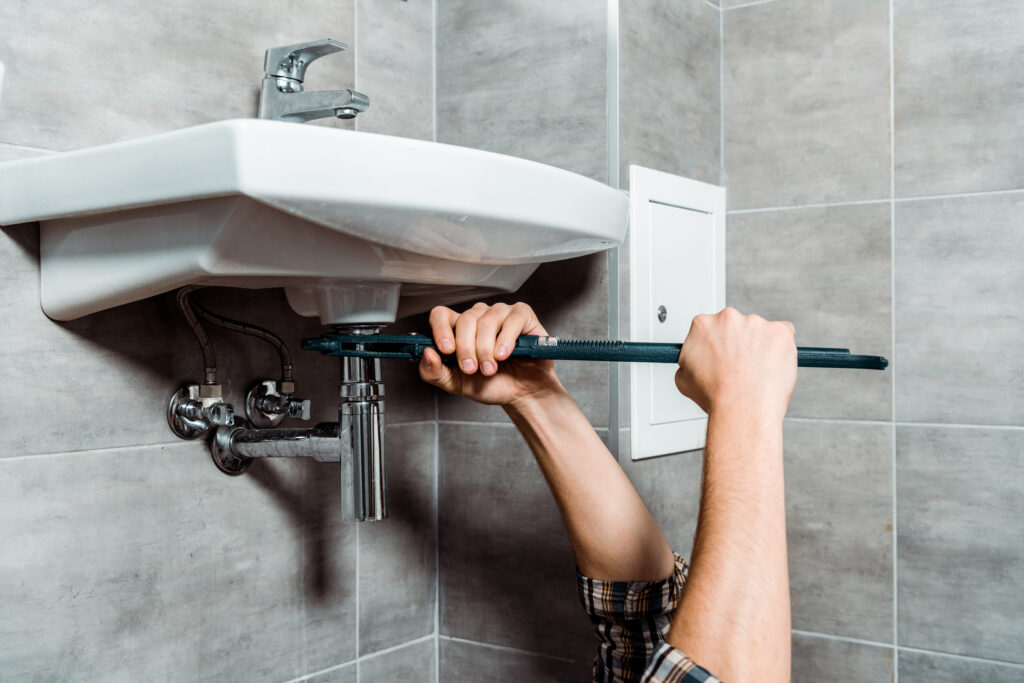Ever looked at a long list of home repairs, puzzled if you need a handyman or a contractor? If you own a home in South Africa, choosing right could save you from a big, costly mistake. It’s key to know what handymen and contractors do best to manage repairs well.
Today, we’ll dive into what these pros do and how to decide who you need for improving your home. By the end, knowing whether to call a handyman for small fixes or a contractor for big projects will be easy. This way, your home stays great without spending too much.

Key Takeaways
- Handyman services are typically suitable for minor repairs and quick fixes around the home.
- Contractors are best for major home improvement projects requiring specialized skills and adherence to building codes.
- Understanding the roles of each can save you time and money.
- Evaluate the scale of your project to determine whether to hire a handyman or a contractor.
- Both professionals play vital roles in maintaining and enhancing your home’s value.
Understanding the Roles: Handyman vs Contractor
When you have tasks at home that need fixing or improving, knowing if you need a handyman or a contractor is key. Each one has special skills for different types of work. This knowledge helps you choose the right person for your project.
Defining a Handyman
A handyman is your go-to for many small home tasks. They are perfect for simple repairs and keep your house running smoothly. Even though handymen know a lot about various jobs, they usually don’t have a formal license in a specific area.
They are the ones you call for a dripping tap, a hole in the wall, or if you want a room painted. Handymen offer quick fixes that don’t cost a lot, making them ideal for daily household issues.
Defining a Contractor
On the other hand, a general contractor is who you need for big changes or detailed work that needs special skills. Contractors are licensed professionals who manage big projects like remodeling your kitchen or adding new rooms.
They make sure everything is done right, follows the law, and passes inspection. Knowing when to hire a contractor can mean your big home project goes smoothly without any legal or structural problems.
When to Hire a Handyman for Home Repairs
Hiring a handyman can save time and money. These skilled pros excel at many maintenance tasks. They repair leaky faucets and do minor electrical work. It’s smart to hire them for smaller tasks. This part talks about handyman services and how they save cash.
Common Handyman Services
Handymen can fix many home issues. Some key services include:
- Leaky Faucet: A handyman can fix a leaky faucet fast. This stops water waste and damage.
- Gutter Cleaning: Clean gutters prevent water damage. Handymen keep your gutters in good shape.
- Minor Electrical Repairs: Handymen safely fix outlets and lights.
Cost-Effectiveness of Hiring a Handyman
Choosing a handyman for small jobs saves money. Here are key reasons:
- Affordable Rates: Handymen charge less than specialists. This makes them great for minor tasks.
- Versatility: A handyman can do many tasks in one visit. This avoids hiring different pros.
- Preventive Maintenance: Regular maintenance tasks stop big, expensive problems.
Knowing when to hire a handyman keeps your home working well. It tackles small fixes and maintenance without fuss.
When to Opt for a Contractor for Home Improvement Projects
Starting a home improvement project might need a contractor’s help. This is especially true for big projects needing special skills. Contractors know how to make sure your work meets all standards and rules.
Large Projects Requiring a Contractor
If you’re planning big updates or adding to your house, it’s best to hire a general contractor. Tasks like room additions, kitchen makeovers, or structural changes require expertise. A contractor’s experience ensures the job is done right and efficiently.
Understanding Building Codes and Permits
Following local building codes and getting needed permits are key for big home improvements. Contractors understand these rules well. This keeps your investment safe and legal. They help get permits quickly, avoiding project delays.
Comparing the Costs: Handyman Services vs Contractor Fees
Understanding the cost difference between handyman services and contractor fees is key when it comes to home repairs. Each offers unique benefits with their own cost structures. Let’s look at the average costs of each to help you decide.
Average Costs of Handyman Services
The average costs to hire a handyman in South Africa change based on the job’s nature and complexity. You might pay between ZAR 200 to ZAR 500 per hour. The cost for bigger tasks may be higher, while smaller repairs usually cost less.
Average Costs of Contractor Services
Contractors handle a wider range of work, often involving more planning and bigger teams. As a result, their average costs tend to be more. For large-scale projects, fees could be between ZAR 2,000 to ZAR 10,000 or even more. It all depends on how big the project is and the contractor’s skills.
Factors Affecting Costs
Many factors can change the cost of hiring a handyman or contractor. Prices vary by location. The specific materials needed and how complex the job is also affect average costs. Always keep these points in mind when planning your budget for home repairs or improvements.
Assessing the Type of Job: Handyman or Contractor?
Choosing between a handyman and a contractor depends on your job’s type. Knowing how big and complex your project is helps you choose wisely. This section explains when to pick a handyman and when you need a contractor.
Small Jobs vs Larger Projects
It’s important to know the difference between small tasks and big projects. Small tasks are quick fixes like repairing a leaky faucet, hanging shelves, or patching drywall. These don’t need special skills or a lot of planning. A skilled handyman can take care of these jobs well.
But, bigger projects need careful planning, special skills, and following building codes. For these jobs, a contractor is often the right choice. Think of home renovations, kitchen makeovers, or adding on to your house. Such jobs need serious changes and take more time, which means a professional contractor is necessary.
Examples of Jobs for Each
- Handyman Tasks:
- Replacing light fixtures
- Installing bathroom fixtures
- Fixing deck boards
- Painting touch-ups
- Contractor Projects:
- Remodeling a kitchen or bathroom
- Building a deck
- Installing new plumbing systems
- Constructing a home addition
By looking at the type of job and what it involves, you can figure out if a handyman or contractor fits your project. Handyman services cover small jobs, while contractors handle larger projects.
Specialized Tasks: Electrical Work and Plumbing
Dealing with specialized tasks like electrical work and plumbing needs the right pros. These areas require expert skills. A skilled electrician or plumber makes sure everything is safe and meets local rules.

When to Hire an Electrician
Electrical jobs are more than just changing bulbs. They include complex tasks that need an expert’s touch. Issues like circuit trouble, updating wires, or setting up new electric parts? Get a pro.
DIY electric work is very risky. It can lead to injury or fires. An expert electrician keeps your home and family safe, following all safety codes.
When to Hire a Plumber
Plumbing is all about complex systems. It needs special skills for fixes or installs. From a dripping tap to fitting a heater, plumbers have the right tools and know-how.
Trying plumbing yourself can be expensive and cause damage. A pro plumber fixes things right, saving you time and cash.
Knowing when to call an electrician or plumber is key for your home’s safety and efficiency. It might tempt you to try fixing things yourself. But, the technicalities in electrical and plumbing tasks usually call for expert help.
Routine Maintenance Tasks: Perfect for a Handyman
Keeping your home in great shape is important. A handyman can take care of many maintenance tasks for you. This helps prevent big repairs and saves money.
Examples of Routine Maintenance Tasks
A handyman can do a lot of different maintenance tasks. Here are some common ones:
- Inspecting and cleaning gutters to prevent water damage.
- Replacing worn-out weather stripping to improve energy efficiency.
- Lubricating door hinges and locks for smooth operation.
- Checking and replacing smoke detector batteries.
- Performing minor paint touch-ups to maintain a fresh appearance.
Benefits of Regular Maintenance
Doing regular maintenance has a lot of good points. Here are some big ones:
- Extend the lifespan of various home components.
- Save money by preventing costly repairs.
- Enhance home safety and comfort.
- Increase property value.
- Provide peace of mind, knowing your home is well-cared for.
So, making routine maintenance a priority keeps your home in top shape. It’s a smart way to protect your investment. A handyman makes sure these jobs get done right and fast.
Major Renovation Projects: Hiring a General Contractor
When you’re planning big renovation projects, getting a general contractor is key. They make sure everything is handled well and finished beautifully. A general contractor is essential in keeping all parts of your large renovation organized, from the start to the inspections at the end.
Roles of a General Contractor
A general contractor is in charge of the whole renovation project. This means they hire and manage subcontractors too. They check that your renovation follows all rules and laws. Plus, a general contractor deals with buying supplies, keeps the project on time, and fixes any surprise problems.
Managing Large-Scale Renovations
Handling big renovations needs know-how and careful attention. This is where a general contractor’s skills really matter. They organize all the workers, keep the project moving on schedule, and check that everything is done right. Having them on your side helps avoid expensive mistakes and bad quality work.
Emergency Repairs: Choosing the Right Professional
Facing a sudden home problem is stressful, especially when it needs quick repairs. Knowing the steps to take and finding the right professional can greatly help solve the issue fast.

Identifying Emergency Situations
Emergency repairs must be fixed right away to avoid more damage or dangers. This includes a leaky roof, a burst pipe, or faulty electricals that could start a fire. It’s important to know these are urgent issues.
Tips for Quick and Efficient Repairs
To handle an urgent repair, start by finding the right expert. Look for licensed pros who know your specific problem, like plumbing or electricity. Keeping a list of trusted pros saves time.
Tell the expert what’s wrong in detail. This lets them prep better for the repair. Make sure they can fix things fast to prevent more issues and get your home safe again.
Understanding emergency repairs and picking the right help keeps your home in good shape. It helps get everything back to normal quickly.
Ensuring Quality Workmanship: Handyman vs Contractor
When fixing up your home, picking the right helper is key. It’s important to know if they are qualified and trustworthy. This guide will show you how to make sure you get the best service for your home improvement projects.
Checking Credentials and References
Start by making sure handymen and contractors have the right paperwork. In South Africa, they need certain licenses and certificates. This shows they know their stuff and follow the rules.
Also, talk to people they’ve worked for before. Happy clients mean a reliable pro. A good worker will have no problem sharing this info. They’ll show you what they’ve done before, proving they do good work.
Guarantees and Warranties
Choosing between a handyman and a contractor can come down to their promises. A good guarantee means if something goes wrong, it gets fixed free. Reliable workers offer these, showing they believe in their work.
Make sure you get how their warranties work. Knowing what’s covered and for how long gives you peace of mind. It means you can trust them with anything from small fixes to big makeovers.
In short, checking qualifications, talking to past clients, and knowing about guarantees makes a big difference. By focusing on these things, you make sure you get the best help. And that means great results for your home.
Handyman vs Contractor: Who should fix and repair what in your home?
It’s important to know when to hire a handyman or a contractor. Each offers value in their area of expertise. This depends on your project’s needs, like home repairs, upgrades, or upkeep.
Deciding Factors
Choosing between a handyman and a contractor depends on your project. If it’s minor repairs or upkeep, a handyman is best. Tasks like fixing a faucet, patching walls, or small paint jobs fit their skills. For big jobs like renovations or structural work, you need a contractor. They handle complex projects and follow building laws.
Summary of Key Points
When picking a handyman or contractor, think about the project’s size and complexity. Important points include:
- Scope of Work: Handymen are great for simple tasks, while contractors tackle bigger, complicated projects.
- Expertise and Licensing: Contractors often have special licenses for certain jobs, which are sometimes required.
- Cost: Handymen usually charge less for small repairs, while contractors might cost more for bigger projects.
By considering these factors, you help make sure your home project is done well and saves you money.
Conclusion
Choosing the right person for your home repairs makes a big difference in the results and your happiness. It’s very important to know what handymen and contractors can do. This knowledge helps homeowners keep their homes in good shape or make them better.
A handyman is great for small jobs and keeping things running. They offer an affordable way to fix minor issues. They can do different tasks without needing special licenses. On the other hand, contractors are best for big, complex projects. They follow building codes and get the right permits. Their skills mean work is done well and follows the law.
Finding the right professional for the job’s size is key to success. Knowing whether to call a handyman or a contractor saves you time and money. It also avoids problems. Making smart choices about the work type means your home projects will be done well. They will look good and work right. This knowledge lets homeowners take good care of their homes confidently.
FAQ
What is the main difference between a handyman and a contractor?
A handyman can do many small repairs and maintenance around the house. A contractor, however, is usually licensed for bigger home improvement projects. These projects often need to follow building codes and get permits.
What kind of tasks is a handyman suitable for?
Handymen are great for fixing things like leaky faucets, hanging lights, or doing routine upkeep. They are a more affordable choice for small jobs.
When should I hire a contractor instead of a handyman?
Hire a contractor for big projects that need special skills and must follow building codes. This includes adding a room, major remodeling, or big structural changes. They handle everything, making sure it meets all legal stuff.
How do building codes and permits affect hiring decisions?
For big home improvements, building codes and permits are super important for safety and following the law. Contractors know all about these rules and can take care of the paperwork. For small jobs, like fixes around the house, you don’t usually need to worry about this stuff, so a handyman works well.
What are the average costs associated with hiring a handyman?
Handyman services generally cost about $50 to $100 per hour. The price depends on how complex the job is and where you live. Handymen tend to cost less than contractors.
What are the average costs associated with hiring a contractor?
Contractors charge more because their projects are usually bigger and more complicated. Their rates range from $50 to $150 per hour. Or, they might charge a percentage of the total project cost, usually 10-20%.
Can a handyman perform electrical work?
A handyman can do simple electrical tasks like setting up lights or outlets. But for anything complicated, it’s best to hire a licensed electrician. This makes sure everything is safe and meets code.
When should I hire a plumber instead of a handyman?
For big plumbing issues, like major leaks or new installations, choose a licensed plumber. Handymen are good for minor tasks like fixing drips or clearing drains.
What routine maintenance tasks can a handyman help with?
Handymen are helpful for many upkeep jobs. This includes cleaning gutters, doing touch-up painting, or preparing your home for different seasons. Keeping up with these tasks helps avoid bigger, expensive repairs later.
What roles do general contractors play in major renovation projects?
General contractors manage big renovation jobs. They take care of planning, budgeting, and working with subcontractors. They also make sure everything is done right and follows the building codes.
How do I identify emergency home repair situations?
Emergencies are things like broken pipes, electrical problems, gas leaks, or anything that could cause more damage or danger. You’ll need to quickly call the right professional—plumber, electrician, or contractor—depending on the issue.
What should I look for when checking a handyman’s or contractor’s credentials?
Make sure they have the right licenses, insurance, and good references. Contractors should also be able to handle permits. Both should offer some kind of guarantee on their work, giving you confidence in their skills.
What key factors should influence my decision between hiring a handyman or a contractor?
Think about how big and complex the job is, how much it’ll cost, if you need to follow codes, and the skill needed. Small fixes are perfect for handymen. But for big projects, especially those that need legal compliance, go with a contractor.




